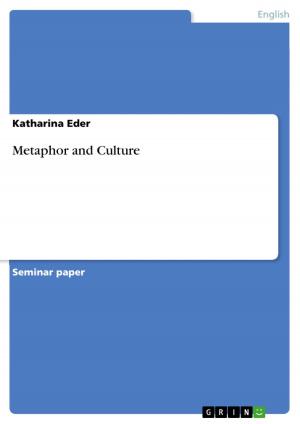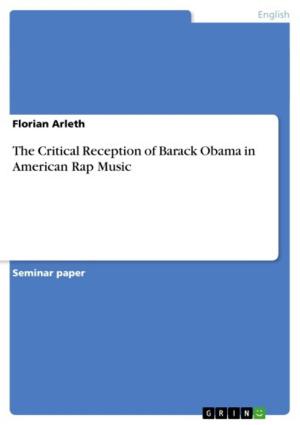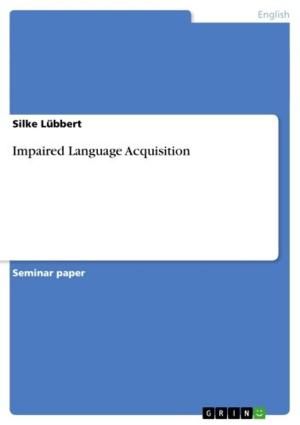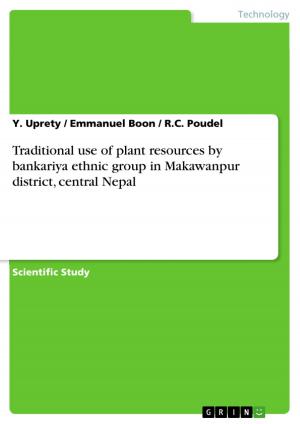Will's development of a sense of home in the context of family and Indian community as displayed in Thomas King's 'Medicine River'
Nonfiction, Entertainment, Drama, Anthologies| Author: | Benjamin Kannenberg | ISBN: | 9783640638581 |
| Publisher: | GRIN Publishing | Publication: | June 7, 2010 |
| Imprint: | GRIN Publishing | Language: | English |
| Author: | Benjamin Kannenberg |
| ISBN: | 9783640638581 |
| Publisher: | GRIN Publishing |
| Publication: | June 7, 2010 |
| Imprint: | GRIN Publishing |
| Language: | English |
Seminar paper from the year 2006 in the subject American Studies - Literature, grade: 1,3, University of Constance, language: English, abstract: The North American Indian's sense of place and desire to find 'home' in modern society is an epic struggle, as their traditional lands have been invaded by a flood of immigrants from around the world. Due to relocation and repeatedly redefined borders, the First Nations' struggle is about more than just land, it is a quest for identity that needs to be redefined and found again. Thomas King's Medicine River is a novel intricately woven with threads of flashbacks and present tense stories of the life of Will Horsecatcher, a half-blood Blackfoot Indian in Alberta, Canada. One of the most important themes in Medicine River is the exploration of a Native person's view of home, including attachment to family and to the Native community. According to The New Shorter Oxford English Dictionary there are several definitions of the term home. Home can be the 'place where one lives permanently, esp. as a member of a family or a household; a fixed place of residence... representing the centre of family life.'1, but also 'A place or region to which one naturally belongs or where one feels at ease.'2. Throughout the novel Medicine River we observe Will's development from a passive, outside observer of a distant and unfamiliar Indian community to an active member therein. We will analyse his journey of coming home both in the context of Will's family life and his acceptance of the fatherhood role and in the context of his return to his roots by claiming his Indian heritage. The first time the term home appears in the book is in a negative family context and takes place in Will's first flashback to his childhood. This very first occurrence of home is a key scene because King subtly reveals several major themes about Will's development in his understanding of home that we will endeavour to analyse throughout the whole novel. The reader has already learned that Will's father has abandoned the family.3 This first looking back to Will's earlier life shows a crucial event: after being hit for the first time in his life by his mother, Will leaves the house to be by himself. In this scene, Will's younger brother James finally finds him and wants him to come home again. Interestingly, Will's first reaction displays his escapist nature. Instead of coming home and facing his mom right away, he delays his return by trying to convince James to lie.
Seminar paper from the year 2006 in the subject American Studies - Literature, grade: 1,3, University of Constance, language: English, abstract: The North American Indian's sense of place and desire to find 'home' in modern society is an epic struggle, as their traditional lands have been invaded by a flood of immigrants from around the world. Due to relocation and repeatedly redefined borders, the First Nations' struggle is about more than just land, it is a quest for identity that needs to be redefined and found again. Thomas King's Medicine River is a novel intricately woven with threads of flashbacks and present tense stories of the life of Will Horsecatcher, a half-blood Blackfoot Indian in Alberta, Canada. One of the most important themes in Medicine River is the exploration of a Native person's view of home, including attachment to family and to the Native community. According to The New Shorter Oxford English Dictionary there are several definitions of the term home. Home can be the 'place where one lives permanently, esp. as a member of a family or a household; a fixed place of residence... representing the centre of family life.'1, but also 'A place or region to which one naturally belongs or where one feels at ease.'2. Throughout the novel Medicine River we observe Will's development from a passive, outside observer of a distant and unfamiliar Indian community to an active member therein. We will analyse his journey of coming home both in the context of Will's family life and his acceptance of the fatherhood role and in the context of his return to his roots by claiming his Indian heritage. The first time the term home appears in the book is in a negative family context and takes place in Will's first flashback to his childhood. This very first occurrence of home is a key scene because King subtly reveals several major themes about Will's development in his understanding of home that we will endeavour to analyse throughout the whole novel. The reader has already learned that Will's father has abandoned the family.3 This first looking back to Will's earlier life shows a crucial event: after being hit for the first time in his life by his mother, Will leaves the house to be by himself. In this scene, Will's younger brother James finally finds him and wants him to come home again. Interestingly, Will's first reaction displays his escapist nature. Instead of coming home and facing his mom right away, he delays his return by trying to convince James to lie.















